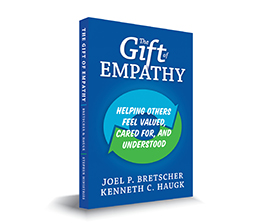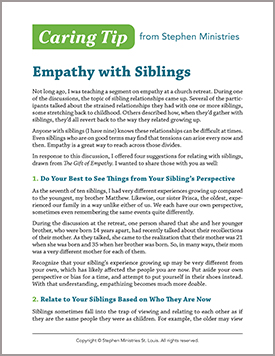
Empathy with Siblings
Not long ago, I was teaching a segment on empathy at a church retreat. During one of the discussions, the topic of sibling relationships came up. Several of the participants talked about the strained relationships they had with one or more siblings, some stretching back to childhood. Others described how, when they’d gather with siblings, they’d all revert back to the way they related growing up.
Anyone with siblings (I have nine) knows these relationships can be difficult at times. Even siblings who are on good terms may find that tensions can arise every now and then. Empathy is a great way to reach across those divides.
In response to this discussion, I offered four suggestions for relating with siblings, drawn from The Gift of Empathy. I wanted to share those with you as well.
1. Do Your Best to See Things from Your Sibling’s Perspective
As the seventh of ten siblings, I had very different experiences growing up compared to the youngest, my brother Matthew. Likewise, our sister Prisca, the oldest, experienced our family in a way unlike either of us. We each have our own perspective, sometimes even remembering the same events quite differently.
During the discussion at the retreat, one person shared that he and his younger sister, who were born 14 years apart, had recently talked about their recollections of their mother. As they talked, she came to the realization that their mother was 21 when she was born and 35 when her brother was born. So, in many ways, their mom was a very different mother for each of them.
Recognize that your sibling’s experience growing up may be very different from your own, which has likely affected the people you are now. Put aside your own perspective or bias for a time, and attempt to put yourself in their shoes instead. With that understanding, empathizing becomes much more doable.
2. Relate to Your Siblings Based on Who They Are Now
Siblings sometimes fall into the trap of viewing and relating to each other as if they are the same people they were as children. For example, the older may view the younger as immature and irresponsible, or the younger may view the older as controlling and domineering—even after decades of growth and change.
A member of our staff at Stephen Ministries shared that he found this especially true with his youngest sister, who was still in middle school when he left for college. For years, his perception of her was based on the preteen sister she was when he left home. When they reestablished their relationship after his sister graduated college, it took some effort for him to get to know her as an adult so he could overcome that outdated impression and better relate to the person she is now.
While aspects of a sibling’s personality may stay consistent over time, they won’t remain entirely the same as they mature and accumulate life experiences. Become acquainted with, accept, and as much as possible appreciate the person your sibling is now. Doing so paves the way for empathizing based on the reality of their current self, not the person they used to be.
3. Avoid Assumptions

For many more practical ideas for putting empathy into action, check out Stephen Ministries’ newest book, The Gift of Empathy.
You can learn more about the book at thegiftofempathy.org.
When relating to someone we have years of history with, we can sometimes fall into the trap of assuming we know what they’re thinking or feeling. Perhaps we’ve seen them in a similar situation before, or maybe we remember how they reacted to a certain event in the past. These experiences can lead us to believe that our sibling will continue to think, feel, and act in the same ways as they have previously.
But those assumptions get in the way of empathy. People change, and the ways they feel and respond change, too. That’s why, when you’re trying to empathize, it’s important to resist the temptation to assume. Instead, listen and seek to understand. Give your sibling the opportunity to express what’s really going on inside; you may find that their real thoughts and feelings are different from what you assumed. When you listen and respond with genuine understanding, not assumptions, your empathy will make a much stronger connection.
4. Have Grace for Each Other
None of us are perfect. Growing up is difficult, and at times we’ve all likely received and inflicted wounds. If that’s the case, do what you can to forgive your sibling—and be willing to seek forgiveness yourself when needed. Have grace for each other, especially for hurts from childhood.
It’s difficult to empathize when we’re holding on to past grievances with someone. It makes us less willing to see things from their perspective, to seek to understand their feelings, or to make a real connection. While it isn’t possible in all sibling relationships, as much as you are able, try to put aside those hurts. Doing so may make it easier to have grace for your sibling.
When you want to empathize with someone, come with an empathy mindset—stay open to people’s experiences, committed to making a personal connection, and ready to make the other person the priority. Using these principles will put you on the right track to empathy that demonstrates compassion, brings comfort, and enriches relationships.

